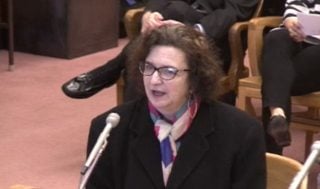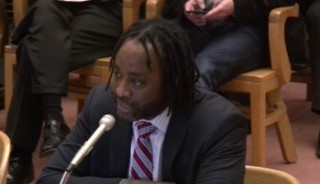
made a dangerous left turn. She testified about it
in Salem yesterday.
A man’s decision to make a dangerous left turn in front of Alistair Corkett back in May led to a horrific outcome. The 22 year-old’s leg was severed from his body. Barry Allen, the man who was at fault for Corkett’s life-changing injury, was only given a traffic ticket.
If Corkett had died in the collision, the Multnomah County District Attorney’s office would have pursued criminal charges which would not only have provided some level of justice for the community but would have allowed Corkett’s family to seek restitution from the state. However, because Corkett “only” suffered an injury, the DA did not pursue criminal charges.
Back in October at a BikePortland event that was inspired by Corkett’s case, Multnomah County DA Rod Underhill did not mince words when expressing his frustration. “It pissed me off. I’m angry. It just doesn’t seem right. We need to change the law.”
“These incidents where people are not charged with a crime, really impact our reputation as a national leader in cycling. People are less likely to come to our state to ride.”
— Kenji Sugahara, Oregon Bicycle Racing Association
Yesterday in Salem Underhill took the first step toward filling “the negligence gap” by testifying at the first public hearing for Senate Bill 1553, which would add 15 words to Oregon’s current definition of assault in the third degree. If the bill passes a person would be guilty of assault in the third degree if the person, “With criminal negligence causes serious physical injury to another who is a vulnerable user of a public way by means of a motor vehicle.” (Note: SB 1553 mostly deals with an unrelated criminal issue, this section is just one small part of it.)
SB 1553 was heard yesterday and this morning by the Senate Judiciary Committee and it’s supported by that committee’s chair, Senator Floyd Prozanski (D-Eugene). Joining Underhill to testify in favor of the bill was Oregon Bicycle Racing Association Executive Director Kenji Sugahara, Deputy DA Glen Banfield (the lead on the Corkett case), and Corkett’s mom Julia Corkett (whom you might recall was present at the protest on SE Powell following her son’s crash).
The Multnomah County DA’s office says this addition to the law is needed to fill the existing gap between a traffic citation and a felony. The DA wants more options in cases like Corkett’s where the guilty party doesn’t meet the high legal threshold for criminal conduct, but deserves much more than a citation. Underhill, an elected official, is also spearheading this effort because he feels like it’s “inequitable” that Corkett’s family cannot seek constitutionally-guaranteed restitution or “prompt prosecution” simply because they are not considered crime victims by the state of Oregon.
Advertisement
“I understand the motivation to want to nail a person to the wall, but I also have concerns the other way. And maybe it’s because of my phobia of driving in Portland where it seems like there are bicycles coming out of nowhere all the time.”
— Sen. Kim Thatcher (R-Keizer)
In her testimony yesterday, Julia Corkett said her son is lucky because he has community support and medical insurance. “But there are lots of people who don’t have that support. This is a good bill,” she said.
Sugahara, an advocate who represents bicycle tourism and racing in Oregon, said it’s about our state’s standing in the eyes of bicycle riders everywhere. “These incidents where people are not charged with a crime, really impact our reputation as a national leader in cycling. People are less likely to come to our state to ride.”
Underhill appealed to the committee’s sense of right and wrong when he said, “Through no fault of his [Corkett’s] own, his life has been permanently altered.” After they were unable to pursue criminal charges, Underhill testified that the level of furstration in his office, “Was palpable.” “We’ve seen a number of these cases over the years and that frustration has mounted. This was the last straw from my standpoint.” (It’s worth noting that Underhill is a competitive bike racer, as are several other DAs.)
There didn’t appear to be any significant opposition to the proposal from committee members or other interest groups. But during a Q & A session following the testimony Senator Kim Thatcher (R-Keizer) expressed concerns that the new law might be unfair to some road users. In a comment directed to DA Underhill, she said, “I understand the motivation to want to nail a person to the wall, but I also have concerns the other way. And maybe it’s because of my phobia of driving in Portland where it seems like there are bicycles coming out of nowhere all the time.”
Underhill clarified that the law would only when two key conditions are met: the person must display “criminal negligence,” and cause serious physical injury. According to existing Oregon law, criminal negligence “means that a person a person fails to be aware of a substantial and unjustifiable risk that the result will occur or that the circumstance exists. The risk must be of such nature and degree that the failure to be aware of it constitutes a gross deviation from the standard of care that a reasonable person would observe in the situation.” This threshold is below the current standard of “reckless conduct” which means the person is aware of the risk but “consciously disregards” it (or in other words, does it on purpose).
The new law would only be triggered by very serious injuries to people on bicycles, motorized scooters, on foot and so on. “We’re trying to protect the most vulnerable road users,” DA Banfield said during testimony this morning. “Pedestrians and cyclists, we’re not looking to protect motorists.”
Another issue is sentencing. With no political appetite for incarceration this law limits sentences to a maximum of 11 months (thus prison is not an option). While it would be a felony charge, in most cases the DA anticipates it would result in probation and a restitution payment plan overseen by a parole officer.
At a second public hearing held this morning, Senate Judiciary Chair Floyd Prozanski sounded very supportive of it. “It seems to me that it’s a tool that may need to be there as an option.” Prozanski also said he appreciates that the sentencing guidelines are being “surgically applied.”
Underhill estimates the law would only trigger for a total of about 15-16 cases statewide per year.
A work session on this bill (and likely vote) is set for February 10th at 8:00 am in Hearing Room 3.
— Jonathan Maus, (503) 706-8804 – jonathan@bikeportland.org
BikePortland can’t survive without paid subscribers. Please sign up today.


